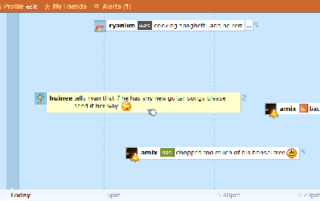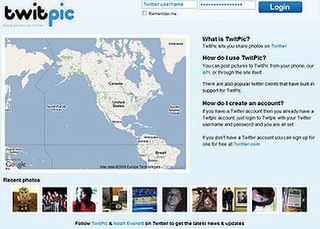Related Research Articles

Jaiku was a social networking, micro-blogging and lifestreaming service comparable to Twitter, founded a month before the latter. Jaiku was founded in February 2006 by Jyri Engeström and Petteri Koponen from Finland and launched in July of that year. It was purchased by Google on October 9, 2007.
HCL Connections is a Web 2.0 enterprise social software application developed originally by IBM and acquired by HCL Technologies in July 2019. Connections is an enterprise-collaboration platform which helps teams work more efficiently. Connections is part of HCL collaboration suite which also includes Notes / Domino, Sametime, Portal and Connections.
Microblogging is an online broadcast medium that exists as a specific form of blogging. A micro-blog differs from a traditional blog in that its content is typically smaller in both actual and aggregated file size. Micro-blogs "allow users to exchange small elements of content such as short sentences, individual images, or video links", which may be the major reason for their popularity. These small messages are sometimes called microposts.

Pownce was a free social networking and micro-blogging site started by Internet entrepreneurs Kevin Rose, Leah Culver, and Daniel Burka. Pownce was centered on sharing messages, files, events, and links with friends. The site launched on June 27, 2007, and was opened to the public on January 22, 2008. On December 1, 2008, Pownce announced that it had been acquired by blogging company Six Apart, and that the service would soon shut down. It was subsequently shut down on December 15, 2008.

identi.ca is a free and open-source social networking and micro-blogging service based on the pump.io software, using the Activity Streams protocol. Identi.ca stopped accepting new registrations in 2013, but continues to operate alongside several other pump.io-based hosts provided by E14N which continue to accept new registrations.

GNU social is a free and open source software microblogging server written in PHP that implements the OStatus standard for interoperation between installations. While offering functionality similar to Twitter, GNU social seeks to provide the potential for open, inter-service, and distributed communications between microblogging communities. Enterprises and individuals can install and control their own services and data.
OpenMicroBlogging is a deprecated protocol that allows different microblogging services to inter-operate. It lets the user of one service subscribe to notices by a user of another service. This enables a federation of new communities, as potentially an organization of any size can host a service. OpenMicroBlogging utilizes the OAuth and Yadis protocols and does not depend on any central authority.
Ping.fm was an advertising-supported social networking and micro-blogging web service that enabled users to post to multiple social networks simultaneously.

Plurk is a free social networking and micro-blogging service that allows users to send updates through short messages or links, which can be up to 360 text characters in length.

TwitPic was a website and app that allowed users to post pictures to the Twitter microblogging service, which at the time of TwitPic's creation could not be posted to Twitter directly. TwitPic was often used by citizen journalists to upload and distribute pictures in near real-time as an event was taking place.
Qaiku was a micro-blogging and lifestreaming service comparable to Twitter and Jaiku. It allowed users to post short text or picture messages that other users can then comment. In comparison to Twitter and Jaiku, Qaiku had a multilingual focus, with all messages marked and searchable based on their language. It was shut down on October 15, 2012.
Google Buzz was a social networking, microblogging and messaging tool that was developed by Google which replaced Google Wave and integrated into their web-based email program, Gmail. Users could share links, photos, videos, status messages and comments organized in "conversations" and visible in the user's inbox.
Tencent Weibo is a Chinese microblogging (weibo) website launched by Tencent in April 2010, and is planned to be shut down on September 28th, 2020. Users may broadcast a message including 140 Chinese characters at most through the web, SMS or smartphone.
Reblogging is the mechanism in blogging which allows users to repost the content of another user's post with an indication that the source of the post is another user.
Weibo is a general term for microblogging, but normally understood as Chinese-based mini-blogging services, including social chat sites and platform sharing.

OStatus is an open standard for federated microblogging, allowing users on one website to send and receive status updates with users on another website. The standard describes how a suite of open protocols, including Atom, Activity Streams, WebSub, Salmon, and WebFinger, can be used together, which enables different microblogging server implementations to route status updates between their users back-and-forth, in near real-time.

Evan S. Prodromou is a software developer and open source advocate. His major contributions have been Wikitravel, Identi.ca, and StatusNet. In 2015 he launched Fuzzy.ai, an artificial intelligence service for developers.

Twister is free software for experimental peer-to-peer microblogging. Being completely decentralized means that no one is able to shut it down, as there is no single point to attack. The system uses end-to-end encryption to safeguard communications. It is based on both BitTorrent and Bitcoin-like protocols and is considered a (distributed) Twitter clone.

The Fediverse is an ensemble of federated servers that are used for web publishing and file hosting, but which, while independently hosted, can communicate with each other. On different servers (instances), users can create so-called identities. These identities are able to communicate over the boundaries of the instances because the software running on the servers supports one or more communication protocols which follow an open standard. As an identity on the fediverse, users are able to post text and other media, or to follow posts by other identities. In some cases, users can even show or share data publicly or to a selected group of identities and allow other identities to edit other users' data.
micro.blog is a microblogging and social networking service created by Manton Reece, the first large multi-user social media service to support the Webmention and Micropub standards published by the World Wide Web Consortium.
References
- ↑ Eldon, Eric. (2008-12-18). "2008 Growth Puts Facebook In Better Position to Make Money". VentureBeat. Retrieved 2008-12-19.
- ↑ Loforo
- ↑ "Control Yourself, Inc. launches Identi.ca, the Open Microblogging Service". Control Yourself, Inc. 2008-07-02. Archived from the original on April 10, 2009. Retrieved 2009-07-02.
- ↑ Malone, Michael (2011-12-05). "News Chiefs 'Tout' Benefits of Social Video". Broadcasting & Cable.
- ↑ Twitter - Where did the idea for Twitter come from?
- ↑ - About Yammer Archived 2011-07-18 at the Wayback Machine
- ↑ "Show HN: A new decentralized microblogging platform | Hacker News". news.ycombinator.com. Retrieved 2017-02-23.
- ↑ Identi.ca bookmarklet Archived July 20, 2009, at the Wayback Machine
- ↑ Loforo
- ↑ Loforo Bookmarklet
- 1 2 "Overview: Version 1.1 of the Twitter API". Twitter. Archived from the original on 24 October 2013. Retrieved 23 October 2013.
- ↑ Loforo